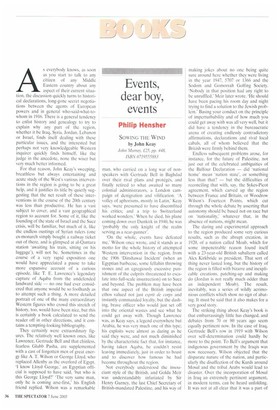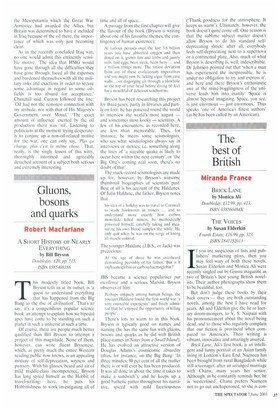Events, dear boy, events
Philip Hensher
SOWING THE WIND by John Keay John Murray, £25. pp. 448, ISBN 0719555883 As everybody knows, as soon as you start to talk to any citizen of any Middle Eastern country about any aspect of their current situation. the discussion quickly turns to historical declarations, long-gone secret negotiations between the agents of European powers and in general who-said-what-towhom in 1916. There is a general tendency to enlist history and genealogy to try to explain why any part of the region, whether it be Iraq, Syria, Jordan, Lebanon or Israel, finds itself dealing with these particular issues, and the interested but perhaps not very knowledgeable Western inquirer quickly finds himself, like the judge in the anecdote, none the wiser but very much better informed.
For that reason, John Keay's sweeping, breathless hut always entertaining and acute study of the West's various interventions in the region is going to be a great help, and it justifies its title by quietly suggesting that the net result of these interventions in the course of the 20th century was less than productive. He has a vast subject to cover, and a vast geographical region to account for. Some of it, like the founding of the state of Israel and the Suez crisis, will be familiar, but much of it, like the endless oustings of Syrian rulers (one ex-monarch simply bought a railway ticket out of there, and is glimpsed at al-Qantara station 'awaiting his train, sitting on his luggage), will not be. Sometimes in the course of a very rapid exposition one would have appreciated a pause to take more expansive account of a curious episode. like T. E. Lawrence's legendary capture of Aqaba from the undefended landward side — no one had ever considered that anyone would be so foolhardy as to attempt such a thing. A more detailed portrait of one of the many extraordinary Western figures who crowd this stretch of history, too, would have been nice, but this is certainly a book calculated to send the reader off in other directions, and it contains a tempting-looking bibliography.
They certainly were extraordinary figures. The relatively well known ones, like Lawrence, Gertrude Bell and that chinless, fearless Glubb Pasha. are supplemented with a cast of forgotten men of great energy like A. T. Wilson or George Lloyd. who replaced Allenby as the overlord of Egypt. 'I know Lloyd George,' an Egyptian official is supposed to have said, tut who is this George Lloyd?' The very same man, only he is coming arse-first,' his English friend replied. Wilson was a remarkable man, who carried on a long war of nonspeakers with Gertrude Bell in Baghdad over their rival plans and protégés, and finally retired to what awaited so many colonial administrators, a London campaign of denigration and vilification. 'A volley of aphorisms, mostly in Latin,' Keay says, 'were presumed to have discomfited his critics; and a trip to Switzerland worked wonders.' When he died, his plane coming down over Dunkirk in 1940, he was 'probably the only knight of the realm serving as a rear-gunner'.
'On the whole, events have defeated me,' Wilson once wrote, and it stands as a motto for the whole history of attempted Western intervention in the region, from the 1906 Dinshawai Incident' (when an Egyptian barbecue, some fellahin throwing stones and an egregiously excessive punishment of the culprits threatened to escalate into full-scale insurrection) on to Suez and beyond. The problem may have been that one aspect of the British imperial ethos valued not just esprit de corps and instantly commanded loyalty, but the dashing, brave officer who would just set off into the oriental wastes and see what he could get away with. Though Lawrence was. as Keay says, a legend everywhere but Arabia, he was very much one of this type; his exploits were almost as daring as he said they were, and not much diminished by the characteristic fact that, for instance, having taken Aqaba, he couldn't resist leaving immediately, just in order to boast and to discover how famous he had become throughout the region.
Not everybody understood the insouciant style of the British, and Golda Meir was understandably infuriated by Sir Henry Gurney, the last Chief Secretary of British-mandated Palestine. and his way of
making jokes about no one being quite sure around here whether they were living in the year 1947, 5707 or 1366 and the Sodom and Gomorrah Golfing Society. 'Nobody in that position had any right to be unruffled.' Meir later wrote. 'He should have been pacing his room day and night trying to find a solution to the Jewish problem.' Basing your conduct on the principle of imperturbability and of how much you could get away with was all very well, but it did have a tendency in the bureaucratic arena of creating endlessly contradictory affirmations, declarations and rival local cabals, all of whom believed that the British were firmly behind them.
Endless subsequent problems arose, for instance, for the future of Palestine, not just out of the celebrated ambiguities of the Balfour Declaration — did 'national home' mean 'nation state', or something less than that? — but the difficulties of reconciling that with, say. the Sykes-Picot agreement, which carved up the region between France and Britain, or Woodrow Wilson's Fourteen Points, which cut through the whole debate by asserting that autonomy should be based not on race but on 'nationality,' whatever that, in the absence of nations, might mean.
The daring and experimental approach to the region produced some very curious results, such as the abrupt creation, in 1920, of a nation called Moab, which for some impenetrable reason found itself with a 23-year-old British subaltern called Alex Kirkbride as president. That sort of thing never lasted long, but the history of the region is filled with bizarre and inexplicable creations, patching-up and making do (Jordan is not really much odder than an independent Moab). The result, inevitably, was a series of wildly acrimonious conflicts which show no sign of abating. It must be said that it also makes for a very good story.
The striking thing about Keay's book is that embarrassingly little has changed, and debates from 70 or 80 years ago seem equally pertinent now. In the case of Iraq, Gertrude Bell's row in 1919 with Wilson over self-determination could hardly be more to the point. To Bell's argument that indigenous government by the Iraqis was now necessary. Wilson objected that the disparate nature of the nation, and particularly the disaffection of the Kurds around Mosul and the tribal Arabs would lead to disaster. Over the incorporation of Mosul in Iraq an extremely pertinent argument, in modern terms. can be heard unfolding. It was not at all clear that it was a part of
the Mesopotamia which the Great War Armistice had awarded the Allies, but Britain was determined to have it included in Iraq because of the oil there, the importance of which was only just becoming clear.
As in the recently concluded Iraq war, no one would admit this eminently sensiMe motive. The idea that HMG would have gone through all the difficulties they have gone through, faced all the expenses and burdened themselves with all the military risks and exactions in order to secure some advantage in regard to some oilfields is too absurd for acceptance,' Churchill said. Curzon followed the line: 'Oil had not the remotest connection with my attitude, nor with that of His Majesty's Government, over Mosul.' 'The exact amount of influence' exerted by the oil production there was 'nil'. Listening to politicians at the moment trying desperately to conjure up a non-oil-related motive for the war, one can only say, 'Plus ca change, plus c'esr la meme chose.' That, really, is the single lesson of this witty, thoroughly informed and agreeably detached account of a subject both serious and extremely interesting.











































































 Previous page
Previous page